Published on April 10, 2014
The US-Korea Institute at SAIS is currently seeking 1-2 Communications interns. Tasks will include such activities as web content management/updates (multiple websites), social media management, media tracking, writing media advisories and event briefs, email newsletter management, event material preparation, and more.
A successful candidate should have superior writing and editing skills (in English), some copywriting experience a plus, with an eye for design, and should have some experience in the following programs: Adobe Photoshop, InDesign and Illustrator; WordPress (or other web content management systems); social media platforms including Facebook, Twitter, and LinkedIn (forums).
USKI internships are unpaid and interns are expected to work at least 4 days a week.
To apply, please email cover letter, resume and short writing sample to Jenny Town, Assistant Director at jtown2@jhu.edu. Only those chosen for interview will be contacted. No phone calls please.
Published on April 10, 2014
The US-Korea Institute at SAIS is currently seeking program and research interns. Multiple positions are open and duties will vary. Some current areas of research include: North Korea political, economic, and social development, North Korean WMD issues, US-ROK nuclear cooperation, US-ROK cooperation in Southeast Asia, US-ROK cooperation nuclear security, US foreign policy to both Koreas, energy security cooperation in Northeast Asia, ROK renewable energy policies, and more.
Interns generally are asked to do a variety of tasks including research assistance, event attendance and reporting, logistical support for events and projects, and other things as necessary. They may work with USKI staff and/or Visiting Scholars on various projects.
Successful candidates should have an interest in Korea and/or East Asia policy and be at least a sophomore in college or higher; graduate students and post-grads are encouraged to apply. Foreign language skills are a plus, but not necessary. Strong writing and editing skillls are preferred. Must be able to multitask, prioitize, meet deadlines, and work well both independently and in small groups.
USKI internships are unpaid and interns are expected to work at least 4 days a week.
To apply, please email cover letter, resume and short writing sample to Jenny Town, Assistant Director at jtown2@jhu.edu. Only those chosen for interview will be contacted. No phone calls please.
Published on September 11, 2013
Utter the words “Taft-Katsura” to an average American and the response will undoubtedly be a blank stare. But I learned from my years of teaching in Korea that the words “Taft-Katsura” will almost invariably invoke a long discourse from Korean professors and students on America’s betrayal of Korea in exchange for Japanese recognition of U.S. interests in the Philippines. “Taft-Katsura” is engraved in many minds as a key element in the victimization of Korea at the beginning of the twentieth century. ~ Dennis P. Halpin
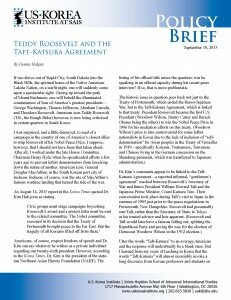
On August 14, 2013, an article from the Korea Times quoted Dr. Kim Hak-joon, president of the Northeast Asian History Foundation (NAHF), who suggested former President Theodore Roosevelt be stripped of his 1906 Nobel Peace Prize.
Dennis P. Halpin, former House Foreign Relations Committee staff member and current Visiting Scholar at the U.S.-Korea Institute at SAIS, examines the history of the Taft-Katsura Agreement in defense of Roosevelt’s legacy.
Download USKI Policy Brief “Teddy Roosevelt and the Taft-Katsura Agreement,” by Dennis P. Halpin.
Dennis P. Halpin is currently a visiting scholar at the U.S.-Korea Institute at Johns Hopkins School of Advanced International Studies (SAIS). He served as a Peace Corps volunteer in South Korea, U.S. consul in Pusan, and a House Foreign Affairs Committee staff member for over twelve years.
Published on August 15, 2013
“An August 1, 2013 editorial in the Yomiuri Shimbun, Japan’s largest circulation daily, carried the title “Comfort Women Allegations Distort Japanese History.” The greatest distortion here is the amnesia of an influential portion of Japanese society in addressing World War II history.” ~ Dennis P. Halpin
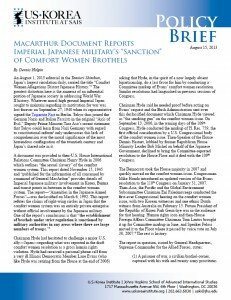 The Yomiuri Shimbun recently published a controversial editorial that challenged the characterization of comfort women as “sex slaves,” and suggested that such labels were historically inaccurate. It noted that the Japanese government could not find official documents proving that the women were recruited by force.
The Yomiuri Shimbun recently published a controversial editorial that challenged the characterization of comfort women as “sex slaves,” and suggested that such labels were historically inaccurate. It noted that the Japanese government could not find official documents proving that the women were recruited by force.
Dennis P. Halpin, former House Foreign Relations Committee staff member and current Visiting Scholar at the US-Korea Institute at SAIS, examines the 1945 report, “Amenities in the Japanese Armed Forces,” published by command of General MacArthur (declassified in 1992) and compiled by the Allied Translator and Interpreter Section (ATIS) of the Supreme Commander for the Allied Forces (SCAP), which refutes the Japanese government’s claims.
Download USKI Policy Brief “MacArthur Document Reports Imperial Japanese Military’s “Sanction” of Comfort Women Brothels,” by Dennis P. Halpin.
read more …
Published on May 29, 2013
“I explained that Americans expected Beijing, a communist dictatorship, neither to understand nor appreciate our Bill of Rights. But it is far more disturbing that an American ally, who aspires to the same democratic values that we do, would demonstrate such a lack of understanding.” ~ Dennis P. Halpin
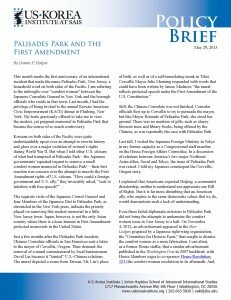 In 2010, the community of Palisades Park, New Jersey dedicated a small memorial to the memory of the “comfort women,” the tens of thousands of women, many of whom were Korean, who were forced into sexual slavery by Japanese military during World War II. In May 2012, the Japanese government sent two delegations of Japanese officials to Palisades Park to implore the local government to remove the memorial; their efforts were unsuccessful and have thus, inspired other Korean communities across the United States to erect similar memorials.
In 2010, the community of Palisades Park, New Jersey dedicated a small memorial to the memory of the “comfort women,” the tens of thousands of women, many of whom were Korean, who were forced into sexual slavery by Japanese military during World War II. In May 2012, the Japanese government sent two delegations of Japanese officials to Palisades Park to implore the local government to remove the memorial; their efforts were unsuccessful and have thus, inspired other Korean communities across the United States to erect similar memorials.
On the first anniversary of this international incident, Dennis P. Halpin, former House Foreign Relations Committee staff member and current Visiting Scholar at the US-Korea Institute at SAIS, discusses discusses why the Japanese government’s efforts, beyond being ineffective, were unconstitutional and should not be repeated. Download USKI Policy Brief “Palisades Park and the First Amendment,” by Dennis P. Halpin.
Dennis P. Halpin is currently a visiting scholar at the U.S.-Korea Institute at Johns Hopkins School of Advanced International Studies (SAIS). He served as a Peace Corps volunteer in South Korea, U.S. consul in Pusan, and a House Foreign Affairs Committee staff member for over twelve years.
Published on July 19, 2012
USKI’s 38 North and Stanford University’s Center for International Security and Cooperation (CISAC) have launched new resources on the history of KEDO to help increase public understanding of what this project was and what it accomplished.
When the South Korean fast ferry Hankyoreh sailed out of North Korean waters into the cold wind and waves of the East Sea on the morning of 8 January 2006, it carried a sad and somber group of South Korean workers, ROK officials, and personnel from the Korean Peninsula Energy Development Organization (KEDO). These were all that remained of a decade long multinational effort transforming what in 1994 had been only a paper notion into a modern construction complex of steel and concrete. KEDO’s profile on the North Korean landscape was unmistakable, its impact on Pyongyang profound. Yet, real knowledge and understanding about the organization in public and official circles in South Korea, Japan, and the United States was terribly thin at the beginning, and remains so to this day. ~ A History of KEDO 1994-2006
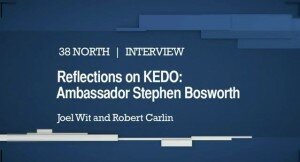 In conjunction with the release of CISAC’s new book, A History of KEDO 1994-2006–an oral history project meant to preserve what remains of the living memory about KEDO, of the thinking that went into setting up the organization, the efforts to coordinate plans and translate them to realities on the ground in North Korea, and the struggle to maintain a sense of sanity while KEDO was pushed and pummeled into disintegration–USKI’s 38 North launches a new video: “Reflections on KEDO.” In this video, Joel Wit (38 North founder and Visiting Scholar at the US-Korea Institute at SAIS), hosts a conversation with Ambassador Stephen Bosworth (former US Special Representative for North Korea Policy and current Dean of The Fletcher School at Tufts University) and Robert Carlin (CISAC Visiting Scholar), about their experiences with KEDO. All three were involved with KEDO at different times in its ten year history and provide insights into what it was like on the ground building this multilateral organization. They discuss some of the major challenges in dealing with the North Koreans, as well as the cultural learning curve faced by KEDO’s multicultural staff. From the perspective of direct experience, they examine both KEDO’s accomplishments and the opportunities missed by the organization’s abrupt termination. In the final segment, Ambassador Bosworth also reflects on the Obama administration’s North Korea policy and provides his views on how to improve relations with the North in the future.
In conjunction with the release of CISAC’s new book, A History of KEDO 1994-2006–an oral history project meant to preserve what remains of the living memory about KEDO, of the thinking that went into setting up the organization, the efforts to coordinate plans and translate them to realities on the ground in North Korea, and the struggle to maintain a sense of sanity while KEDO was pushed and pummeled into disintegration–USKI’s 38 North launches a new video: “Reflections on KEDO.” In this video, Joel Wit (38 North founder and Visiting Scholar at the US-Korea Institute at SAIS), hosts a conversation with Ambassador Stephen Bosworth (former US Special Representative for North Korea Policy and current Dean of The Fletcher School at Tufts University) and Robert Carlin (CISAC Visiting Scholar), about their experiences with KEDO. All three were involved with KEDO at different times in its ten year history and provide insights into what it was like on the ground building this multilateral organization. They discuss some of the major challenges in dealing with the North Koreans, as well as the cultural learning curve faced by KEDO’s multicultural staff. From the perspective of direct experience, they examine both KEDO’s accomplishments and the opportunities missed by the organization’s abrupt termination. In the final segment, Ambassador Bosworth also reflects on the Obama administration’s North Korea policy and provides his views on how to improve relations with the North in the future.
My personal conclusion was they [North Koreans] were very serious about what they were doing—the enterprise that we were involved in. This was not something just being done for show. For them, it was not just KEDO and the Agreed Framework and light water reactors, but it was clear for many of them this was important because it was setting a series of precedents for how North Korea could begin to engage with rest of the world in a more direct and active fashion. ~ Ambassador Stephen Bosworth, “Reflections on KEDO,” a 38 North interview
Find the 38 North video here.
Published on October 5, 2011
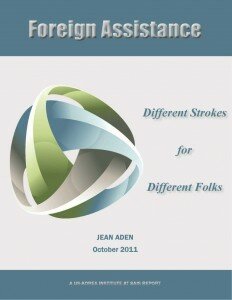 The US-Korea Institute at SAIS is pleased to release the first report in a three-part series by Dr. Jean Aden, examining South Korea’s ODA future.
The US-Korea Institute at SAIS is pleased to release the first report in a three-part series by Dr. Jean Aden, examining South Korea’s ODA future.
Having accomplished one of the most successful economic transformations of the twentieth century, transitioning from a major aid recipient to major aid provider within fifty years, Korea has recent firsthand development knowledge and experience to share with others who are in the process of development, and is keen to develop its position as a donor and member of the international donor community, commensurate with the size of its economy. Despite having only recently joined the DAC, the OECD’s choice to locate the 4th High Level Forum for Development Effectiveness (HLF-4) in Busan in November 2011 is an indicator of Korea’s potential to help shape the strategic agenda, while expanding its own development commitments. read more …






